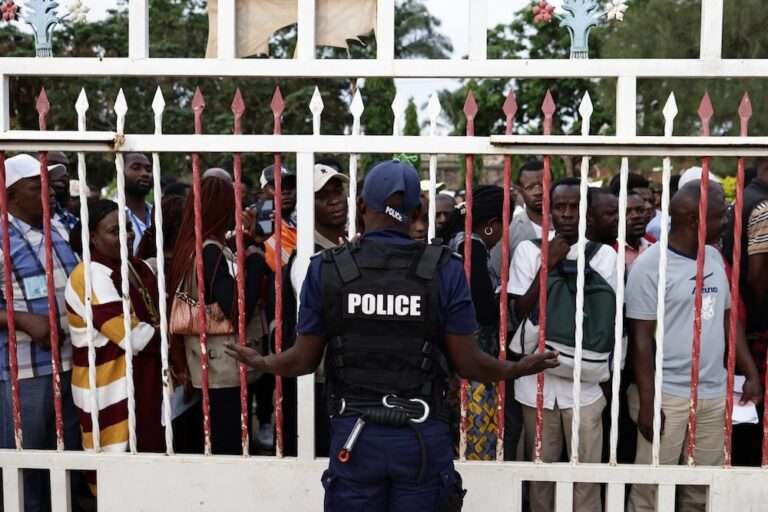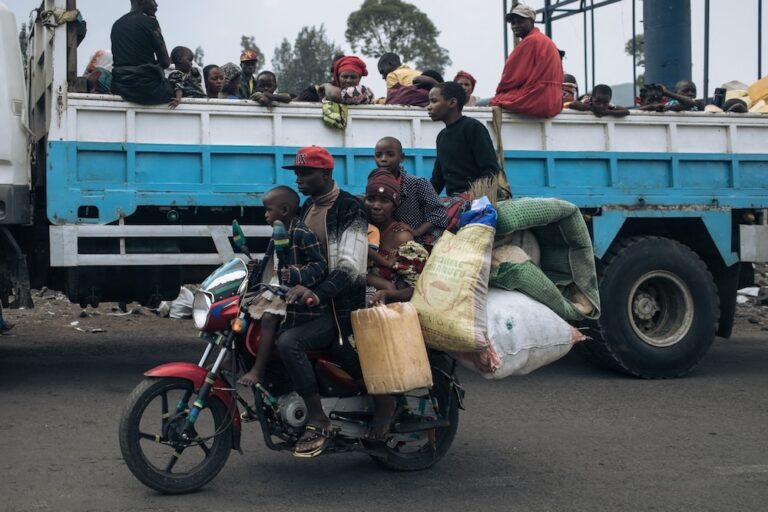(RSF/IFEX) – The following is a 10 March 2006 RSF press release: Visiting team looks at Ngyke murder, press offences and journalistic corruption Reporters Without Borders visited the Democratic Republic of Congo this week with the aim of supporting its Kinshasa-based partner organisation, Journalist in Danger (JED), and urging the authorities to shed light on […]
(RSF/IFEX) – The following is a 10 March 2006 RSF press release:
Visiting team looks at Ngyke murder, press offences and journalistic corruption
Reporters Without Borders visited the Democratic Republic of Congo this week with the aim of supporting its Kinshasa-based partner organisation, Journalist in Danger (JED), and urging the authorities to shed light on last November’s murders of journalist Franck Ngyke and his wife.
The aim of the visit, from 7 to 9 March 2006, was above all to ensure that the Ngyke case is not exploited for political ends, to try to work with the authorities to seek a just and conciliatory solution to the crisis set off by these murders, and to evaluate the current state of press freedom in Kinshasa.
During the visit, Reporters Without Borders and JED also issued an energetic protest against dangerous behaviour by the Congolese press at a key period for peace in the region.
Murder of Franck Ngyke
The head of the political affairs section of the independent daily “La Référence Plus”, Ngyke was shot dead by gunmen inside the compound of his home in Kinshasa at 1 a.m. on 3 November 2005, as he arrived from work. His wife, Hélène Paka, was killed by the same assailants, whose exact motives are still unknown.
Second lieutenants Joël Mungande Kimbao and Didier Awatimbine and warrant officer Munongo Muyika have been detained as suspects. Col. Mputu Mpende, a member of the Kinshasa-Matete military inspectorate, told Reporters Without Borders that, in the course of their initial enquiries, the police discovered that these three soldiers had used the victims’ mobile phones during the 12 hours following the double-murder. Two civilians have also been arrested because of their contacts with the three soldiers on 3 November.
During a meeting with Reporters Without Borders and JED yesterday, President Joseph Kabila gave an undertaking that a “public trial” would be held in this case “before the presidential election” scheduled for June. Vice-President Azarias Ruberwa, who heads the transitional government’s “political, defence and security commission,” gave a similar undertaking the day before.
Kabila, who was meeting with the JED leadership for the first time since becoming president, also promised that JED would be ‘associated with the follow-up of the case,” without specifying how. Alluding to the death threats received by JED members in recent weeks, Kabila told them: “You have the president’s protection.”
Three journalists in prison
Reporters Without Borders and JED also visited the three journalists currently held in the Kinshasa Penitentiary and Reeducation Centre (CPRK), the former Makala prison. Jean-Pierre Pambu Lutete, the editor of the newspaper La Tolérance, and Jean-Louis Ngalamulume, the editor of the newspaper L’Eclaireur, are being held pending trial for libel. Patrice Booto, the editor of Le Journal and its supplement Pool Malebo, has been held since 2 November for allegedly violating state security.
In their meeting with the Congolese authorities, Reporters Without Borders and JED obtained assurances that Lutete and Ngalamulume would soon be granted conditional release pending resolution of the libel actions brought against them.
Reporters Without Borders again appealed to President Kabila, Vice-President Ruberwa, the justice minister and the press and information minister, for press offences to be decriminalized, stressing that prison sentences for press offences is contrary to the international democratic standards advocated by the UN and the Organisation Internationale de la Francophonie (OIF).
Reporters Without Borders also argued that punishments in proportion to the offence (such as fines or court-ordered publication of apologies or corrections) are also fair because they redress the offence effectively, while imprisonment is not only unfair but also counter-productive as it can attract sympathy and concern for journalists who have broken the rules of professional ethics and conduct. Reporters Without Borders and JED intend to submit a draft reform law to the Congolese authorities in the coming weeks.
As regards Booto, Reporters Without Borders stressed the Kafkaesque nature of his situation in which he was tried by the State Security Court (CSE) two days before the promulgation of a new constitution that dissolved the court. However, before its dissolution, the court deferred issuing a verdict on Booto, leaving him in legal limbo. President Kabila promised that “a judicial decision will be taken” once the case has been assigned to another court.
Booto was charged with spreading false rumours in public, offending the president and insulting the government in an article claiming that Kabila had offered the Tanzanian education system $30 million dollars at a time of tension between the government and education unions in the DRC. Booto acknowledged to the CSE that his information was incorrect.
Corruption and manipulation in the Congolese press
At the same time, Reporters Without Borders and JED stressed that corruption and manipulation is a serious problem with the Congolese press as in other sectors of society. They said it was unacceptable in the run-up to key elections that pages in publications that appear irregularly are sold off to the highest bidder by pseudo-journalists offering to sing the praises of public figures or attack their rivals.
Hate messages orchestrated by political or ethnic clans are regularly carried by Congolese newspapers and radio stations. Journalism has its rules and those who break them must be punished. Reporters Without Borders calls on Congolese press freedom organisations, press regulatory and self-regulatory bodies and professional organisations to work together to clean up the press and to monitor and punish any excesses or deviations from good journalistic practices. This will also make it easier to defend Congolese journalists.
Delegation’s composition, activities
The Reporters Without Borders delegation consisted of its secretary-general, Robert Ménard, and the head of its Africa desk, Léonard Vincent. The JED delegation consisted of its president, Donat M’Baya Tshimanga, its secretary-general, Tshivis Tshivuadi, and its legal adviser, Charles Muggaga Mushizi.
In addition to President Kabila and Vice-President Ruberwa, the officials they met included William Lacy Swing, who is the head of the UN mission and the UN secretary-general’s special representative, Carlo de Filippi, the head of the European Commission’s delegation, and French ambassador Georges Serre.
In addition to the three imprisoned journalists, the Reporters Without Borders and JED delegation met with Ngyke’s children Djudju and Francine, and their cousin Cloclo, who all witnessed the double murder, La Référence Plus editor André Ipakala, Col. Mpende, who is in charge of the military investigation into the Ngyke murder, justice minister Kisimba Ngoy, press and information minister Henri Mova Sakanyi, High Media Council president Modeste Mutinga and the steering committee of the National Union of the Congolese Press (UNPC).


